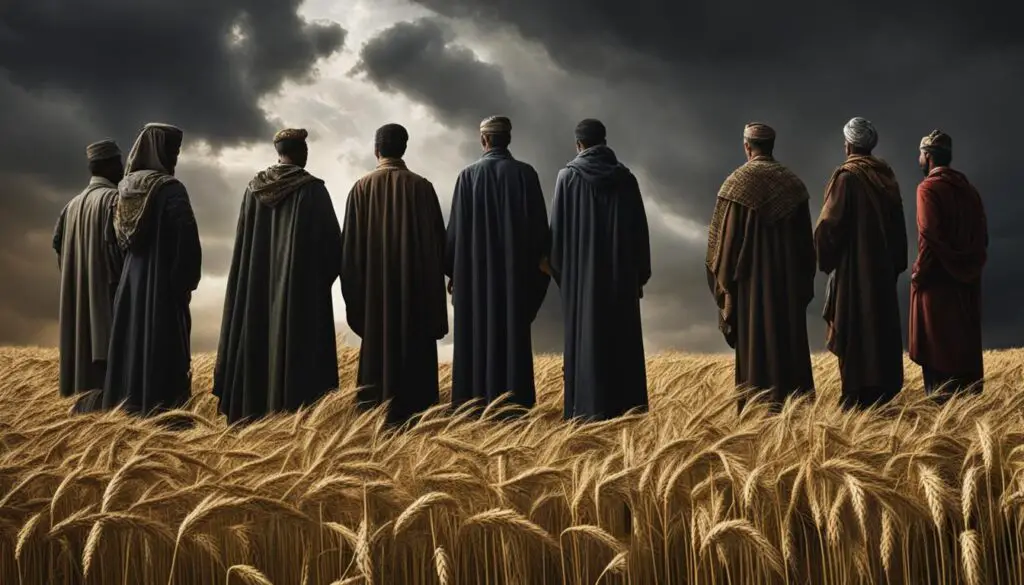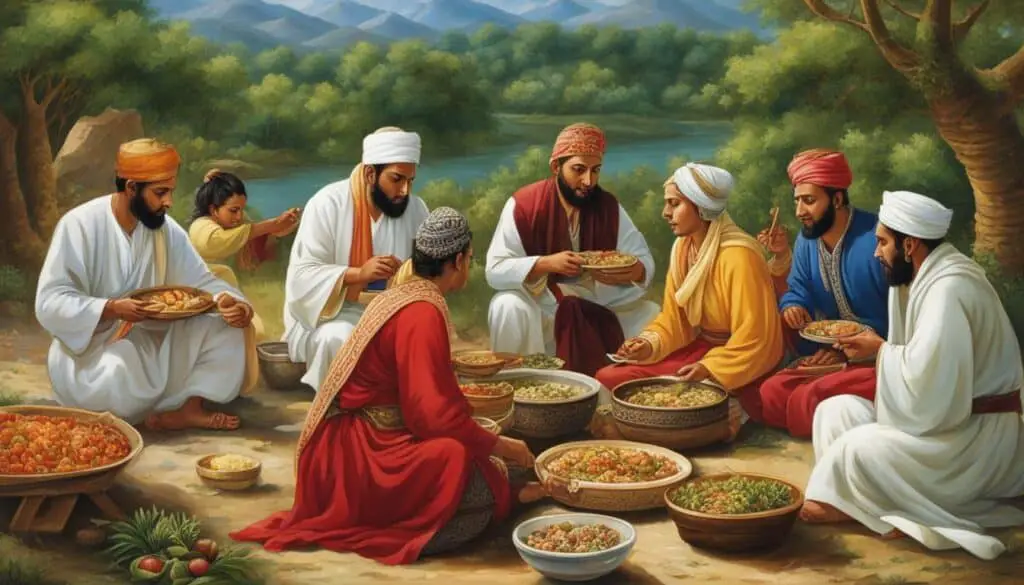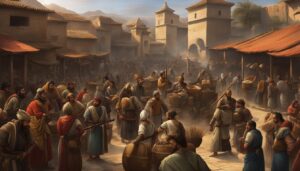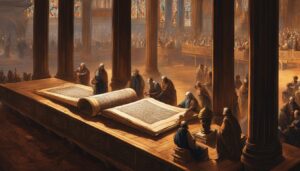
The era of the biblical prophets was a time of profound societal change and moral transformation. These influential figures played a crucial role in shaping the norms and values of their society, leaving a lasting impact on religious teachings and cultural practices. Understanding the societal norms during this era is essential for comprehending the messages and impact of these prophetic voices.
During their time, the prophets served as inspired spokesmen of God, delivering messages that addressed the social problems of their society. Their teachings were not mere suggestions or personal opinions but were meant to be followed without alteration. They sought to guide God’s people towards righteousness and bring about positive societal changes.
By delving into the historical and cultural context of the prophets, we gain a deeper understanding of the moral guidelines they imparted and the societal changes they sought to implement. Their teachings challenged prevailing cultural practices and traditions that were contrary to God’s commands. Through their messages, they denounced behaviors such as idol worship and human sacrifices that were prevalent during that time.
This section will explore the societal norms, the influence of the prophets, and the religious teachings that shaped the cultural practices during the era of the biblical prophets. It will shed light on the profound impact these prophetic voices had on their society and how their messages shaped the moral fabric of the community.
Key Takeaways:
- The prophets of the Old Testament played a significant role in shaping societal norms during their era.
- Their teachings were inspired by God and aimed to guide God’s people towards righteousness.
- Understanding the historical and cultural context is crucial for grasping the moral guidelines they imparted.
- The prophets challenged and transformed cultural practices that were contrary to God’s commands.
- The impact of the prophets on societal norms during their time cannot be underestimated.
The Role of Prophets in Shaping Societal Norms
The prophets of the Old Testament played a significant role in shaping societal norms during their time. As mediators of the covenant between God and the people of Israel, their primary task was to call the community to accountability and responsibility in their relationship with God. They preached the Word of God without adding their own plans for social reform, focusing on delivering messages aimed at shaping the behavior and values of God’s people.
Prophets provided moral guidelines by which society should adhere, emphasizing justice, equity, and compassion. Their teachings influenced the behavior, traditions, and values of the community, leading to societal changes. The impact of the prophets on societal norms cannot be underestimated, as their messages challenged existing cultural practices that were contrary to God’s commands.
“Prophets are not sent by God to endorse societal practices but to challenge them.”
Through their teachings, prophets sought to transform societal practices shaped by tradition, guiding the community towards a more ethical and righteous path. By denouncing idol worship, human sacrifices, and other immoral behaviors prevalent in their society, the prophets aimed to reshape societal values and establish a society that aligned with God’s will.
Overall, the teachings and messages of the prophets had a profound impact on the behavior and norms of society during their era. While their applicability to modern times may vary, understanding the historical and cultural context in which the prophets lived is crucial for comprehending the moral guidelines they imparted and the societal changes they sought to bring about.

The Influence of Prophetic Teachings on Societal Norms
The influence of prophetic teachings on societal norms can be seen in various aspects of the community’s behavior and traditions. The prophets challenged the status quo, calling for reforms and moral transformation. Their teachings set the foundation for ethical conduct and spurred changes in societal norms.
| Traditions Shaped by Prophetic Teachings | Moral Guidelines from the Prophets | Societal Changes Influenced by Prophetic Messages |
|---|---|---|
| The abolition of idol worship | Commands to love God and one’s neighbor | Shift towards monotheism and rejection of polytheism |
| Denouncement of human sacrifices | Emphasis on justice and fairness | Abandonment of cruel rituals and practices |
| Rejection of oppressive social structures | Call to care for the widows and orphans | Advancement of social justice and welfare |
These examples illustrate how prophetic teachings contributed to the transformation of societal norms, moral values, and traditions during the era of the prophets.
Cultural Practices and Traditions During the Time of the Prophets
The era of the biblical prophets was characterized by a rich tapestry of cultural practices and traditions. These customs played a significant role in shaping the social fabric of the society in which the prophets lived. However, not all of these practices aligned with the moral guidelines imparted by the prophets. Through their teachings and messages, the prophets sought to challenge and transform these cultural practices in accordance with the will of God.
One of the key cultural practices prevalent during the time of the prophets was idol worship. Many societies engaged in the worship of false gods and idols, which the prophets vehemently denounced. They called their people to turn away from these practices and to worship the one true God. The prophets emphasized the importance of monotheism and the worship of God alone, challenging the deeply rooted traditions of idolatry.
Another cultural practice that the prophets sought to transform was the offering of human sacrifices. In some societies, the act of sacrificing humans, often children, was seen as a way to appease the gods or gain favor. The prophets condemned such practices as abominable and contrary to the will of God. They called for the preservation of human life and the pursuit of justice and mercy.
The teachings of the prophets also aimed to transform societal attitudes towards issues such as poverty, oppression, and injustice. They emphasized the importance of caring for the less fortunate, defending the rights of the vulnerable, and upholding the principles of justice and equity. These teachings challenged existing cultural norms that allowed for the exploitation and mistreatment of certain segments of society.
Table: Cultural Practices During the Time of the Prophets
| Cultural Practice | Prophetic Teachings |
|---|---|
| Idol Worship | The prophets denounced idol worship and called for the worship of the one true God. |
| Human Sacrifices | The prophets condemned the offering of human sacrifices and emphasized the preservation of human life. |
| Poverty and Injustice | The prophets called for the care of the less fortunate and the pursuit of justice and equity. |
Through their teachings and messages, the prophets sought to reshape the societal values and establish a society based on justice, equity, and compassion. While the cultural practices and traditions of their time may have been deeply ingrained, the prophets challenged them with a higher moral standard. Their teachings continue to inspire and guide individuals today, offering timeless wisdom on how to navigate the complexities of society while adhering to the principles of righteousness.

Conclusion
The prophets of the Old Testament held immense influence over the societal norms of their time. Through their religious teachings, they played a pivotal role in shaping the behavior and values of the community. As mediators of the covenant between God and the people, their primary objective was to hold individuals accountable and responsible in their relationship with God.
The messages of the prophets were not mere suggestions for social reform; rather, they were divine directives that were meant to be followed without alteration. Their teachings set the moral guidelines for society, leading to significant societal changes during their era.
The prophets, driven by a desire to establish a society based on justice, equity, and compassion, challenged deeply entrenched cultural practices and traditions. They denounced practices such as idol worship and human sacrifices, seeking to transform societal values in accordance with God’s commands.
While the applicability of the prophets’ teachings to modern times remains a subject of debate, their profound influence on societal norms cannot be denied. Their messages continue to inspire and provoke thought, raising important questions about the relationship between religious teachings and societal behaviors.
FAQ
How did the prophets of the Old Testament influence societal norms during their era?
The prophets played an active role in addressing the social problems of their time and offering solutions. Their teachings and messages influenced the behavior and values of the community, leading to societal changes.
Did the prophets offer their own plans for social reform?
No, the prophets did not offer their own plans for social reform. They preached the Word of God without additions or diminutions.
What was the primary focus of the prophets’ messages?
The primary focus of the prophets’ messages was to shape the behavior and values of God’s people. They set moral guidelines by which the society should adhere.
Did the prophets challenge cultural practices and traditions?
Yes, the prophets challenged cultural practices and traditions that were contrary to God’s commands. Their teachings sought to reshape societal values and establish a society based on justice, equity, and compassion.
What impact did the prophets have on societal behavior and norms?
The prophets had a significant impact on societal behavior and norms during their era. Their teachings and messages influenced the community, leading to changes in societal norms.
Can the teachings of the prophets be applied to modern times?
The applicability of the prophets’ teachings to modern times is a subject of debate. However, the impact of their messages on societal norms during their era cannot be denied.








